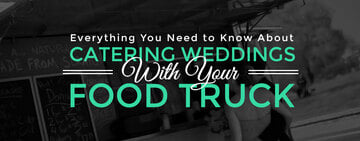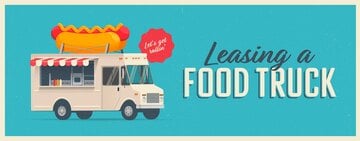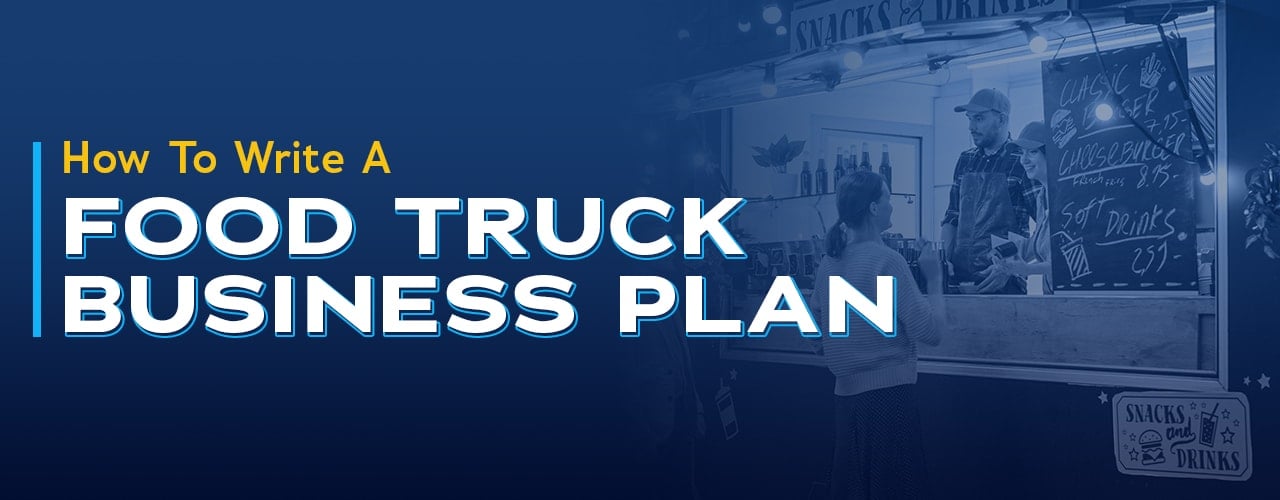
Food trucks are at the forefront of influencing upcoming food trends and can be a very profitable business. But before you can start your own food truck business, you’ll need to plan out your concept and how you’ll fund that dream. Writing a food truck business plan helps you lay out the details of your new endeavor and address the questions of potential investors. Because this is such an important step, it should be completed before you even buy a food truck.
Shop All Food Truck SuppliesFood Truck Business Plan Template
We've outlined how to format your business plan and listed the key topics you should cover. Below you'll find some food truck business plans suggestions to give you an idea of what to include when writing your own.
1. Executive Summary

The first section of your food truck business plan is the executive summary. Think of this as your introduction to the reader. To make a good first impression, you should be concise and interesting without explaining too many granular details. You can cover the finer points of your business in the following sections. This is your chance to highlight who your company is, how you expect it to grow, and why your food truck will be successful.
In the executive summary, you should identify the gap in your target market that your company can fill. It's also a good idea to cover how your knowledge and background will benefit you as you pursue your company goals of opening a food truck business. Although the executive summary is the first section your potential investor will read, you should write it last.
Food Truck Business Plan Executive Summary Considerations
These are the key topics to include in a food truck executive summary:
- What type of food do you plan to offer?
- Where do you plan to sell your food?
- Why will this type of food be successful in the area where you plan to sell it?
- What is the projected cost and profit of your food truck business?
- What are your future goals for your food truck business?
2. Company Description
Use this section of your food truck business plan to explain the details of your company. Describe your food truck business and convey how it will be a valuable addition to the existing market. Essentially, this is the section where you can expand upon the topics you briefly mentioned in the executive summary.
Food Truck Company Description Considerations
Think about these food truck company description questions as you write your business plan:
- What kind of food truck will it be (truck, trailer, or food cart)?
- Why a food truck as opposed to a brick-and-mortar location?
- Will you prepare your food in the truck or a commissary kitchen?
- How will the food items you provide compete with the menu items of existing food trucks or restaurants in your target area?
- What specific consumer niche will you serve?
- What is your overall competitive advantage (your unique cuisine, your outstanding customer service, your creative marketing, etc.)?
3. Market Analysis
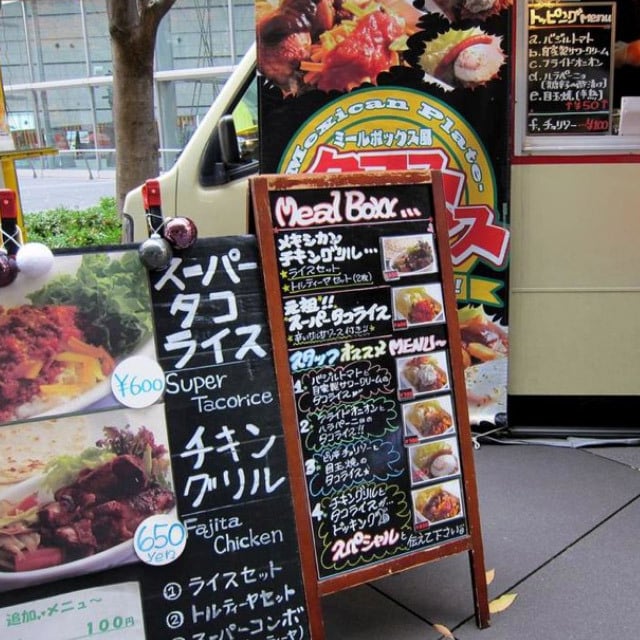
The market analysis section of your food truck business plan is where you will explain and detail how you'll fit into the existing market. It's important to do extensive research on starting a food truck business before writing this section so you can include solid research findings to back up your conclusions.
Food Truck Marketing Analysis For Business Plan
Cover these topics in your food truck market analysis section:
- Describe the food industry, including current trends, growth rate, major consumer groups, etc.
- Pinpoint the age group, geographic area, socioeconomic status, and other key demographic information of your target market.
- Identify the needs of your target market and any seasonal trends that could impact your business.
- Define the size and growth potential of your target market.
- State how you will gain a large percentage of the market share in your geographic location.
- Explain your pricing structure, gross margin levels, and any other financially relevant information.
- Identify your competitors and explain how you will make your food truck a viable contender in current and future markets.
- Address any obstacles you may encounter as you start your food truck business.
- Cite food codes and other governmental regulations that will affect your business.
Back to Top
4. Organization and Management
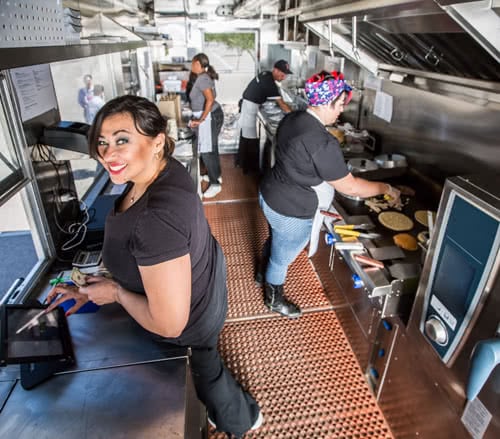
The next step of your food truck business plan is to outline your organization and management plan. Explaining your organization and management structure may not seem that important if you're hoping to open up a food truck manned by two people. However, outlining responsibilities from the start helps to avoid confusion as your business grows and develops.
This section should include a detailed profile of your management team, information about the ownership of your company, the salary and benefits you'll offer your workers, and growth opportunities for people within your organization. Creating a chart that shows the organizational structure of your business is a great way to illustrate that all the bases are covered, from the cooks in your food truck kitchen to the accountant who balances your checkbook.
Food Truck Ownership Information
Include this ownership information in the food truck organization and management section of your business plan:
- Legal structure (Are you forming a partnership? Are you a sole proprietor?)
- Full names of the owners
- Percentage of the company each owner holds
- Type of ownership (common stock, general partner, etc.)
- Stock information
Profiles of Your Food Truck Management Team
The following details should be included in the management section of a business plan for food trucks.
- Manager's full name
- Position and primary responsibilities
- Educational background
- Prior employment and how it relates to his/her position within your company
- Important experience and skills that will help your business be successful
- Past track record with hard numbers to back it up
- Food industry recognition
- Community involvement
- Salary
5. Service or Product Line

Use the service and product line section to describe your food truck menu items. What unique flavors are you offering and how will your products entice passersby and convert them into die-hard fans? This is the section where you can display your innovative ideas, describe your products, and explain how you will keep customers coming back for more.
Food Truck Menu Description for Business Plan
Here are some questions to consider when creating a profitable menu for your food truck:
- What type of cuisine will you offer?
- Why are you passionate about this type of food?
- Why will customers eat your food?
- What is your competitive advantage?
- Are your recipes well-established or still being developed?
Food Truck Product Line
Next, you'll want to explain where your products are in terms of life cycle by answering the following questions:
- Are you launching a totally new product?
- Are you already gaining popularity with your target market?
- What might cause a decline in demand for your product?
Food Truck Intellectual Property
Discuss any intellectual property that might be included in your food truck menu items to protect them:
- Do you have any trade secrets or patents in the works?
- Will you require your staff to sign any non-disclosure or non-compete agreements?
Food Truck Projections
Show that you have considered the future of the menu for your food truck with these questions:
- How do you see your menu changing over time?
- Are you developing any new products?
- Do you plan to own a fleet of food trucks someday?
- Will you expand your reach by attending food truck fairs or booking catered events?
6. Marketing and Sales
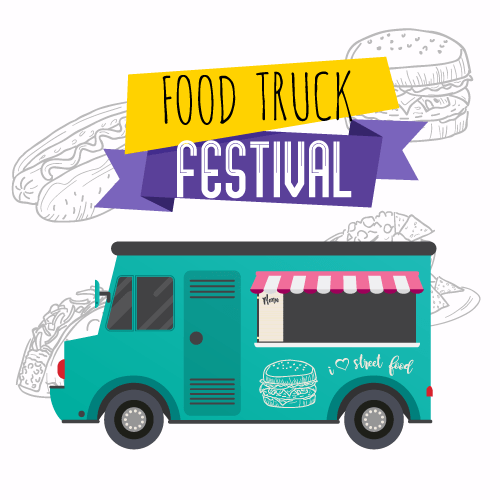
The marketing and sales portion of your food truck business plan is focused on building customer loyalty. You will need to define your overall marketing and sales strategies, but how you do so is completely up to you. One important thing to remember is that customers value originality, whether that means adopting a recognizable food truck design or creating a unique selling point for your food truck.
Food Truck Marketing and Sales Questions
Provide answers to these important questions in the food truck sales and marketing section:
How will you compete with other food trucks in your area?
- Will you set your prices lower than your competitors'?
- Will you offer a product that has never been seen before?
How will you grow your business?
- Will you hire more employees?
- Will you acquire more food trucks?
- Will you extend the geographic area your truck serves?
How will you distribute your products?
- Will you sell only from your truck?
- Will you attend food truck fairs or festivals?
How will you reach your customers?
- Will you advertise on traditional media (radio, newspaper, billboards)?
- Will you develop a social media presence by utilizing Facebook, Twitter, Instagram, or TikTok?
- Will you offer special rewards or discounts for returning customers?
- Will you give away free samples to entice future customers?
- Will you create an interactive map to help customers locate your truck?
How many sales are necessary for your food truck to be profitable?
- What is a fair menu price for the products you'll be selling?
- How many days will you take off in a year?
- Will you sell throughout the winter or just during the warmer months?
Back to Top
7. Funding Request

Not every food truck business plan has a funding request section, but it's something to consider including. It can be tricky to map out how much a food truck costs, but it is a necessary part of securing a startup loan.
If you do plan to request funding, you should clearly explain how much funding you need, what you need it for, and how you'll repay anything you owe. Make sure to include the cost of food truck insurance, the cost of fuel and any permits or licenses you'll need to start doing business.
Funding Section of Business Plan for Food Trucks
Think about these important questions when you create your food truck funding request:
- How much capital do you really need?
- Do you foresee needing more funding in the future?
- How will you use the funds you are awarded?
- How will you repay your loans?
- What are the potential benefits to an investor if your food truck does well?
- How would these funds create new opportunities for your food truck?
8. Financial Projections
It's difficult to know what realistic food truck financial projections are when you're starting your food truck business from scratch, but to allocate funds efficiently, it's important to analyze your target market and set clear financial goals.
If your business has already been in operation for a few years, this is the section of the food truck business plan where you'd include historical financial data. However, if you're just starting out, you will need to calculate how much your business will potentially make over the next five years using realistic assumptions. Make sure that these food truck financial projections align with the funds you asked for in your funding request.
9. Appendix
The appendix section isn't necessary in every food truck business plan, but this is a great place to include information that didn't fit anywhere else, from product photos to building permits to letters of reference.
Back to TopStarting your own food truck is overwhelming at first, but writing a business plan is a great first step. It will help you get organized and cover details that you may not have originally considered. Once you have completed your business plan, you’ll be ready to put your dream into motion.



